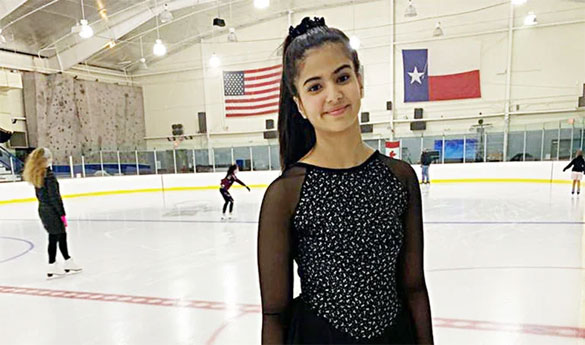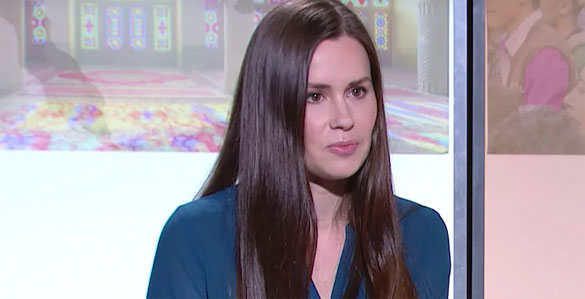Three Arab Women Top The ‘Forbes Middle East’ List as Richest Businesswomen
New Age Islam News Bureau
4
Aug 2020
•
Malak Al-Shaya, Saudi Figure Skater Nurtures Olympic Dream
•
Kylie Moore-Gilbert, British-Australian Woman in Iran Prison ‘Is Well’
• Businesswomen Showcase Products
at Saudi Festival
• Iran Women's Podcast Gives
Voice to Victims Of Abuse
• Report Details Scores of Women
Missing In Northern Syria After Kidnap By Turkish-Backed Jihadists
Compiled by New Age Islam News
Bureau
URL: https://www.newageislam.com/islam-women-feminism/three-arab-women-top-forbes/d/122543
--------
Three
Arab women top the ‘Forbes Middle East’ list as richest businesswomen
2020-08-03

Egyptian,
Iraqi and Lebanese women topped the Forbes Middle East list as richest
businesswomen.
-----
Iraqi-American
makeup artist, Huda Kattan, topped the Forbes Middle East list this year with
her Huda Beauty makeup brand which boasts more than 46 million Instagram
followers. Her estimated worth stood at $610 million last year.
The
fashion sector represented 42% of the list with 17 businesswomen, led by famous
Lebanese fashion designer, Reem Acra. The jewellery sector took the second
place in the list, with nine brands, led by Egyptian, Azza Fahmy, and her two
daughters, Amina and Fatma Ghaly.
This
year, the magazine launched the list of businesswomen, which featured top 10
women behind the most successful tech-based companies in the Middle East, that
have succeeded in collecting investments and financing millions of dollars from
investors. Mona Ataya and her partner Leena Abi Khalil topped the list with
their brand Mumzworld, which has raised more than $50 million from investors.
Lebanese
women topped the list with 14 entries, followed by 10 Saudi entries, 10
Egyptian entries, and five Jordanian women.
https://en.royanews.tv/news/21674/Three-Arab-women-top-the-%E2%80%98Forbes-Middle-East%E2%80%99-list-as-richest-businesswomen
--------
Malak
Al-Shaya, Saudi Figure Skater Nurtures Olympic Dream
August
04, 2020

Malak
Al-Shaya says when in the ice rink everything feels ‘magical’ around her.
(Photo/Supplied)
------
JEDDAH:
A Saudi teen who picked up ice skating three years ago at a friend’s birthday
party is now dreaming of taking part in the Olympic Games.
“It
all started at my friend’s birthday party three years ago where we ice skated
and I fell in love with the sport. I started going every day after that. My mom
signed me up for classes when she saw my love for the sport,” Malak Al-Shaya
told Arab News.
She
said: “My mom was the one that encouraged me. At that birthday party, my mom
and the coach said I was a natural because I just went for it.”
She
came 4th at the Houston Invitational 2020 in March. She said that she will work
harder next year to win first place.
The
13-year-old hopes to emulate the Russian figure skaters Elena Radionova and
Alexandra Trusova who inspired her and even to get to the Olympics.
“I’ll
work on ice and off ice. I want to be like Alexandra Trusova, who makes it look
so elegant,” she said.
Gliding
on the ice, Al-Shaya said she feels like everything is “magical.”
The
young figure skater is aware that the sport is not the most popular in the
Kingdom, but she encourages those wishing to master it.
“Just
go for it. If you are willing to work hard you can achieve anything,” she said.
She
has received a lot of encouragement on social media to pursue her passion in
figure skating.
Al-Shaya’s
mother, Eman Al-Damegh, shared her daughter’s love story. “At that birthday
party, it was the first time Malak ever ice skated. After that, my kids used to
ask me to take them ice skating every day,” she said.
She
said that her daughter came from a background, which lacked the facilities for
the sport, but was “a natural” straightaway.
“She
had never been ice skating before, she started it at such a young age. We used
to live in Qassim where there were no ice-skating arenas at all,” said
Al-Damegh.
She
added: “The moment Malak set foot inside the rink, she just took off. I was so
surprised, she didn’t hesitate at all, she was so daring that day. And there I
was wondering what would happen on ice (before she started).”
According
to her proud mother, Al-Shaya has all the capabilities required for this sport
and possesses the sense of daringness that skating requires.
The
teen’s coach told Al-Damegh that her daughter’s speed was impressive, adding
that it takes them years to teach a student to reach the speed that she is
“naturally able to control comfortably.”
https://www.arabnews.com/node/1714291/saudi-arabia
--------
Kylie
Moore-Gilbert, British-Australian Woman In Iran Prison ‘Is Well’
August
04, 2020

This
image made from a 2017 video by The Modern Middle East shows Kylie
Moore-Gilbert, a University of Melbourne scholar on the Middle East.
-----
CANBERRA,
Australia: An Australian ambassador has visited a British-Australian academic
convicted of espionage before being moved recently to a notorious Iranian
prison and found that she “is well,” Australia’s government said Tuesday.
Kylie
Moore-Gilbert was a Melbourne University lecturer on Middle Eastern studies
when she was sent to Tehran’s Evin Prison in September 2018 and sentenced to 10
years.
Concerns
for her well-being escalated with news last week that she had been moved to
Qarchak Prison, east of Tehran.
Australia
sought urgent consular access and its ambassador to Iran, Lyndall Sachs,
visited Moore-Gilbert in Qarchak Prison on Sunday, Australia’s Department of
Foreign Affairs and Trade, or DFAT, said in a statement.
“Dr.
Moore-Gilbert is well and has access to food, medical facilities and books,”
the statement said. “We will continue to seek regular consular access to Dr.
Moore-Gilbert.”
Moore-Gilbert’s
family said they were reassured by the ambassador’s prison visit.
“We
remain committed to getting our Kylie home as soon as possible and this is our
top and only priority,” a family statement said.
“We
continue to believe that Kylie’s best chance at release is through diplomatic
avenues and are in close contact with DFAT and the Australian government on the
best ways to achieve this,” the statement added.
In
2018, Moore-Gilbert was arrested at Tehran airport while trying to leave Iran
after attending an academic conference.
The
Center for Human Rights in Iran, a US-based organization, said last week that
Moore-Gilbert was being held with violent criminals under harsh conditions.
Reza
Khandan, husband of human rights lawyer and Evin Prison inmate Nasrin Sotoudeh,
posted on social media last week that Moore-Gilbert had been transferred “as a
form of punishment.”
Australia
describes Moore-Gilbert’s case as one of its highest priorities.
Moore-Gilbert
has gone on hunger strikes during her time in custody and pleaded for the
Australian government to do more to free her during almost two years in
custody.
She
wrote to Australia’s prime minister last year that she has been “subjected to
grievous violations of my legal and human rights, including psychological
torture and spending prolonged periods of time in solitary confinement.”
https://www.arabnews.com/node/1714506/middle-east
--------
Businesswomen
showcase products at Saudi festival
August
04, 2020
UNAIZAH:
Enterprising businesswomen were given a platform to showcase their products
during a popular Saudi dates festival.
Organized
by the Unaizah Chamber of Commerce and Industry in partnership with the
municipality of Unaizah, the event allocated space for female entrepreneurs to
sell dates and related items. Chair of the chamber’s women’s committee, Mariam
Al-Hamad Al-Mutairi, said the sales opportunity at the Unaizah Dates Festival
had been part of the chamber’s efforts to support productive families in the
province.
https://www.arabnews.com/node/1714331/saudi-arabia
--------
Iran
women's podcast gives voice to victims of abuse
4
August 2020
Maryam's
voice trembles as she tells what happened when her husband attacked her in
public.
"People's
reaction was like it was normal to see a man beating his wife. There's no law,
there are no safe houses, and even the police can't do much. Some families also
act like they're so modern and they say, 'Oh it's a private matter'."
Her
story is a rarely heard one in her home country of Iran, but since the creation
of a new podcast, many more women like her are coming forward to share
unflinching accounts of their experience of domestic violence.
They
have been encouraged by Maryam (not her real name) to use the medium as a
platform to break their silence, challenging traditional societal taboos.
"Become
Scheherazade," Maryam tells them - an allusion to the mythical Persian
Queen who prevented her own death through her gift for storytelling, one of the
main protagonists in the epic The One Thousand and One Nights.
But
these stories are a world away from the trappings of ancient folklore, and
rooted in a society that largely encourages women to keep quiet.
'A
family matter'
Maryam,
34, met her husband at university where she studied child psychology.
She
defied her parents in Tehran to marry the man she loved, who she initially
considered a liberal thinker and an advocate of workers' rights.
But
just days into the marriage, she realised something was not right. In the
podcast she describes how "pride and a reluctance to admit defeat"
prevented her from seeking help from her mother and father.
She
endured physical and mental abuse throughout her marriage and, to make matters
worse, was made to believe that it was her own fault.
After
all, like many women in Iran, Maryam grew up with the familiar maxim: "A
woman enters a man's house in a white bridal dress and leaves only in a white
shroud."
Maryam
says widely accepted social norms prevented her from getting out of the
marriage sooner.
Iranians
are traditionally deeply private people and family issues usually remain behind
closed doors. Because of this, domestic abuse has become endemic and women are
encouraged to remain loyal and be patient.
Maryam
finally decided to leave after she ended up in a hospital bed after a sustained
beating. In her semi-conscious state, unable to move because of her injuries,
she says she asked herself: "Why am I here and why has this happened to
me?"
Weeks
later, she was discharged and filed for divorce. Fortunately her parents
supported her decision - but not all victims are so lucky.
In
each podcast, Maryam is joined by women who share their own experience of abuse
at the hands of male members of the family.
New
law?
As
well as personal stories, the podcast also examines the issue of the systemic
lack of protection for women suffering violence, particularly domestic abuse.
The
only official statistics ever commissioned in Iran on the subject was 16 years
ago, which found that two-thirds of Iranian women had experienced domestic
abuse at least once.
The
London-based human rights group Amnesty International said in a 2013 report on
Iran that women in the country "faced discrimination in law and practice
in relation to marriage and divorce, inheritance, child custody, nationality
and international travel".
The
tragic murder of a teenage girl by her father in a so-called "honour
killing" has prompted Iran's President Hassan Rouhani to demand a speedy
review of the bill on the protection of women from violence. This, almost a
decade after it was drafted.
The
bill - which will still need to be approved by the largely conservative
parliament before it becomes law - offers the potential for the biggest change
to women's rights since the 1979 revolution.
It
recognises physical violence towards women as a crime and, for the first time,
also assigns punishment for harassment in public and on social media.
Five
years since the end of her marriage, Maryam says she has never been happier. As
well as podcasting, she also holds counselling sessions for victims of abuse,
most of whom are women.
She
hopes that giving people the freedom to speak out will help end the culture of
secrecy that, she laments, "only emboldens your abuser."
https://www.bbc.com/news/world-middle-east-53566261
--------
Report
details scores of women missing in northern Syria after kidnap by
Turkish-backed jihadists
AUGUST
3, 2020
MORE
than 160 women and girls have been kidnapped by Turkish-backed jihadists since
the invasion of Afrin, northern Syria, in 2018, according to a report released
by the Missing Afrin Women Project today.
According
to the report, which draws on reports from media and human rights organisations,
the women are subjected to torture and sexual violence after being accused of
working with the Kurdish-led Syrian Democratic Forces (SDF).
This
includes participating and voting in elections held in the semi-autonomous
region known as Rojava and documenting information about the situation in Afrin
or sharing such information with outside sources.
The
Missing Afrin Women Project believes that about a third of the 161 kidnapped
have been released from captivity, with the whereabouts of the others unknown.
Reports
from the region and interviews with survivors suggest that torture, cruel and
degrading treatment as well as sexual and gender-based violence are pervasive
and systemic.
“We
were dozens of kidnapped women of different ages, among us were minor girls,
who were always raped; one of them, named Zaloukh, died from heavy bleeding
after being raped,” one survivor said.
She
explained how the women were transported blindfolded in the night, with the
jihadists threatening to execute them.
“Many
of the abductees committed suicide, and others were killed in cold blood, their
bodies thrown in the forests near the villages in Azaz, Al-Bab, Afrin and
Jarabulus,” she said.
Others
have been accused of witchcraft or collusion with the Peoples’ Protection Units
(YPG), with jihadists demanding large ransoms from their families.
As
reported in the Morning Star in May a “torture camp” was discovered in Afrin,
where mainly Kurdish and Yazidi women were held by militia from the Hamza
Division.
Footage
circulating on social media appeared to show the women being tortured and
stripped naked in the camps, amid allegations of rape and sexual abuse.
The
international community, including the United Nations, has been accused of
complicity in the war crimes committed in northern Syria due to inaction.
Europe-wide
Kurdish women’s rights organisation TJK-E argued that “the international
institutions which remain silent on the atrocities committed in front of the
world are as responsible for this brutality as Turkey.”
As
many as 300,000 people have been internally displaced since Turkey’s invasion
and subsequent occupation of Afrin. Nato’s second-largest army launched its
assault in January 2018, allied with multiple jihadist organisations.
Syrian
Democratic Council spokeswoman Ilham Ahmed warned of a Turkish project to
change the demography of the region and obliterate its historical Kurdish
identity.
https://morningstaronline.co.uk/article/w/report-details-scores-women-missing-northern-syria-after-kidnap-turkish-backed
--------
URL: https://www.newageislam.com/islam-women-feminism/three-arab-women-top-forbes/d/122543
